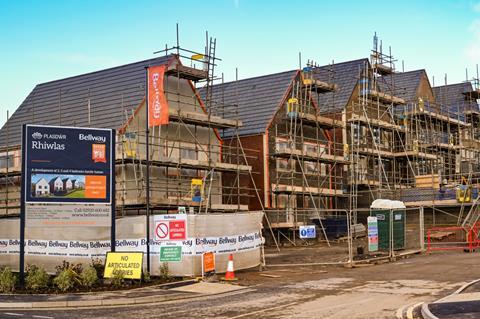Housebuilder says it will pare back targets because of mini-budget’s impact
Bellway has abandoned plans to increase its output by nearly 10% this year in the face of the deepening market uncertainty heightened by the recent mini budget fiasco.
Announcing full year results for the year to July 2022, in which it reported pre-tax profit sharply down as a result of a £346m provision for fire safety repairs, the Newcastle-based, listed housebuilder said it now expected volume for the current financial year to be “similar” to the 2022 level.
As recently as August, Bellway had said it planned to grow output from the 11,198 homes built in the 2022 financial year to at least 12,200 homes in the 2023 accounts.

In a statement accompanying the results, it said: “Supported by our recent investment in land and work-in-progress, the Group retains the operational capacity to grow output up to 12,200 homes.
“Output is, however, expected to be more moderate, given the uncertain economic backdrop. […] given this, the Board currently expects volume output to be similar to the prior year.”
The firm said that reservations had “moderated” in recent weeks – though it only provided data up until 2 October, just 10 days after the mini budget – with weekly reservations of 191 per week in the nine weeks since the end of the financial year, 12.4% down on the same period in 2021.
This comes after Barratt last week said its private sales per site in the period since the start of September had fallen 47% on the previous year, though Bellway did not reveal what its sales rate per site was, or separate out affordable housing sales from private reservations.
The firm said the final outcome for volume was dependent on the spring and autumn selling seasons, and that the business would “prioritise the high standard of our product, margin, quality of profit and value creation” in deciding how to respond to market conditions.
It said there was also a “wider” range of outcomes for profitability that the previous year.
>> See also Housebuilders share prices rise as Hunt delivers emergency statement
>> See also What are housebuilding’s prospects in the wake of the mini budget?
The statement comes amid fears of a wider housing market slowdown amid rising interest rates and fears over a deepening economic crisis, with Capital Economics last week predicting housing starts will drop by 38% next year.
Its forecasts came as Bellway reported pre tax profit of £304m, down 37%, on record turnover of £3.54bn, up 13%. The firm’s underlying pre-tax profit, which discounted the impact of the £346m fire safety remediation work charge, was £650m, up 23%.
The firm said it had net cash of £245m but had experienced build cost inflation of around 10% over the year, which saw no sign of abating.
Chief executive Jason Honeyman said it had delivered “another strong performance” and that it retained its ambition to grow to an output of as many as 16,000 homes per year in the medium term. However, it expects to rein in land buying activity in the year ahead.
He said: “Our strengthened land bank and resilient balance sheet provide a platform for long-term growth and, importantly, during a period of economic uncertainty, they enable the Group to take a more cautious approach to land investment in the year ahead.
“Our long-term model is our strength and is supported by an underlying demand for new homes. Bellway’s growth will continue to be disciplined as we maintain a clear focus on the high standard of our product, margin, quality of profit and value creation.”
Shane Carberry, equity analyst at Goodbody, said Bellway’s trading update highlighted the “challenging backdrop housebuilders are facing, with softening demand and cost inflation not abating”.
He added: “While [chancellor] Jeremy Hunt’s intervention [yestrday] provides some cause for optimism for the sector, it won’t stop demand for housing from cooling. Indeed the sector is faced with many issues and there will undoubtedly be more challenges ahead as the housing market struggles with affordability issues in the context of the cost of living crisis.”
Bellway shares fell 1% in early trading.


























No comments yet